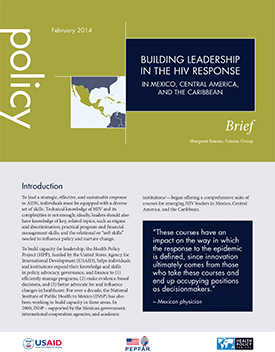The Health Policy Project ended in 2016. Work continued under Health Policy Plus (HP+) until 2022.
PUBLICATION
Author(s): Margaret Reeves
Primary Language: English
Date: 2/11/2014
Abstract:
To successfully lead a strategic, effective and sustainable response to AIDS, individuals must be equipped with a diverse set of skills. However, many individuals rise to leadership positions with purely medical backgrounds and lack essential skills in management, finance, advocacy and policy, and governance. For over a decade the National Institute of Public Health (Instituto Nacional de Salud Pública – INSP), part of the National Health Institutes of the Health Ministry in Mexico, has designed and conducted training courses to augment HIV leaders’ skills in these critical areas and to strengthen the regional AIDS response, particularly in Mexico, Central America, and the Caribbean.
The USAID-funded Health Policy Project commissioned a case study of INSP’s educational programs to better understand what elements are critical for such programs to be successful, what challenges they face, and to identify opportunities to strengthen and expand regional capacity-building efforts in the future.
The results indicated that the students surveyed felt INSP’s multidisciplinary training approach for leaders in the region’s HIV and AIDS response fostered a more harmonized response to the epidemic. Further, the lessons and tools learned through INSP modules and courses become a principal resource for former students who go on to play strategic roles in national and state AIDS programs, as well as civil society. INSP course alumni feel better equipped to make decisions based on available evidence, to design and implement strategic prevention and care strategies, and to contribute to policy development. However, challenges remain and to sustain and expand, the INSP and other training initiatives must find ways to reduce course costs and required time commitments without sacrificing the quality and comprehensiveness that has made them so effective.
Opportunities for continued education and virtual support through networking will also provide critical ongoing support. To maximize impact, curricula should take into account the unique economic, political, social, and cultural characteristics of individual countries; differences in infrastructure and human resources; and the diverse ways the AIDS epidemic manifests across the region. Those interviewed indicated that comprehensive training programs such as those developed by INSP play an essential role in equipping national and regional leaders to improve and expand HIV and AIDS services. The INSP programs fill a critical gap in human resource training and efforts should be made to mobilize the resources and support needed to expand and duplicate these kinds of training opportunities.
Best Practices Brief Capacity Development HIV Leadership Caribbean Region Global LAC


